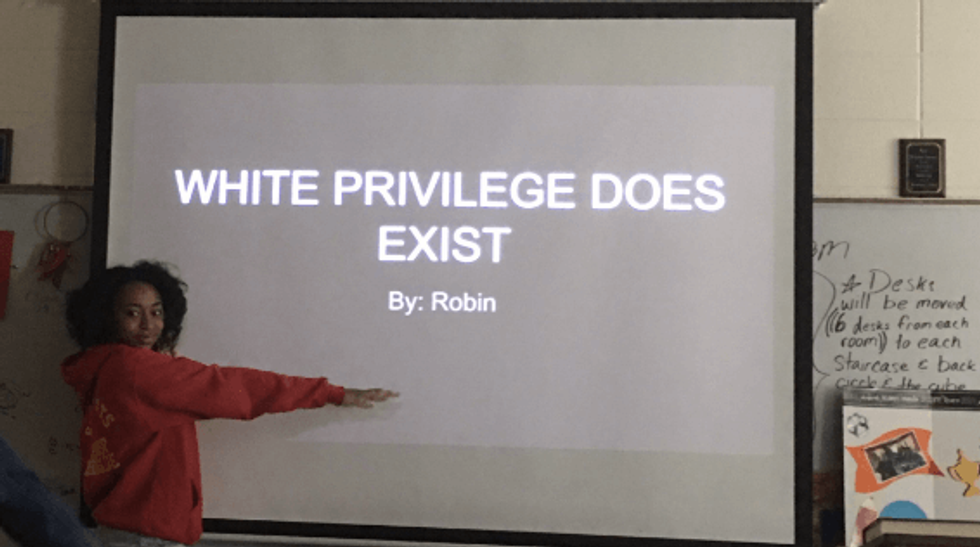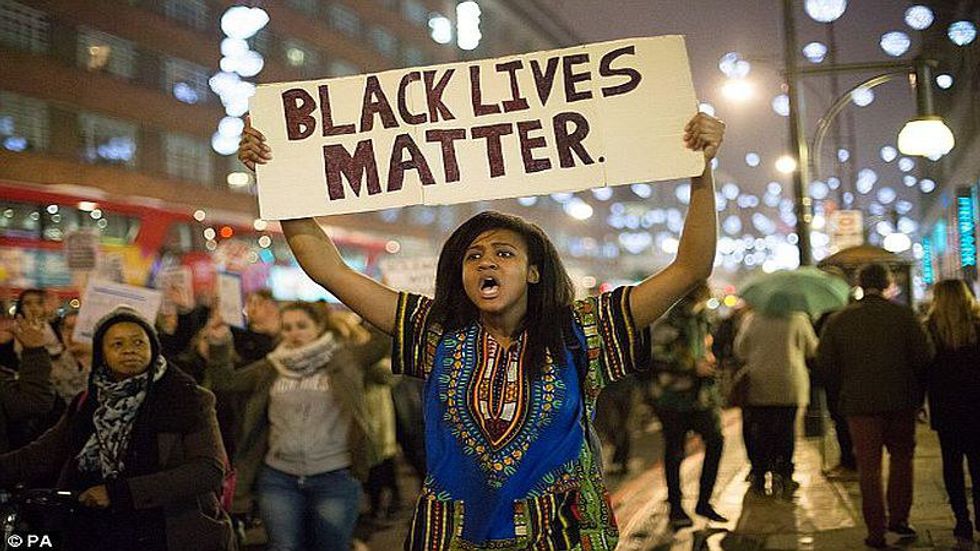When I was little, for whatever reason, I—an African American girl—thought that I was white. And not just white: I was a red-headed white girl. According to my family, for years I told them that I was white and that my white family was going to “come get me and take me home to my real family.” They knew I meant it, but found it laughable. They let me be. They knew better than I did and just let me go about my merry way, not once correcting me. It wasn’t until I began attending school did I learn very rudely from one white boy that, in his words, I was an n-word and needed to stop acting white. As a child, I didn't really grasp the seriousness of his words, but it affected me deeply. I remember feeling sad and somehow inferior. He was white and I was not.
This was my first experience of racism and white privilege, but not all racist or white privilege moments are quite so overt and easily recognizable as this. I’ve experienced so many instances of white privilege that I can’t recount every single one. For the longest time, it baffled me that people could deny its existence, but after my curiosity turned into frustration, I decided that I would practice what I preach and education myself. So, I began doing research on white privilege and learned that I despite experiencing the negative side of it, I had never actually been able to define it properly to anyone. If you had asked me before, “What is white privilege?” I would’ve told you something along the lines of "the fact that white people will never have to worry about racism." But white privilege isn’t quite just that.
After reading various academic sources, I found the most concise, accurate, and simple definition of white privilege from Wikipedia. It defines white privilege as "societal privileges that benefit people identified as white in Western countries, beyond what is commonly experienced by non-white people under the same social, political, or economic circumstances." I also found Francis Kendall’s Understanding White Privilege’s definition quite elucidating. She defines white privilege as an institutional set of benefits granted to people that “resemble the people who dominate the powerful positions in our institutions.” Kendall explains that the difficulty for white people to acknowledge and understand white privilege comes from the fact that they were born into this system that was created by members of their race long ago to preserve what they had perceived as belonging only to them. Because of this, asking a white person about white privilege is synonymous to asking “a fish to notice water or a bird to discuss air.”
Because of this, I thought it important to interview people. However, this task proved itself incredibly difficult. Outside of my own personal limitations, I also faced resistance. I failed to interview many non-white people; thus, the majority of my interviewees were white. I suppose that’s actually a good thing since mostly white people deny the existence of white privilege. I asked each person the same questions, apart from three people who wished to only make statements about white privilege. The questions are as follows:
1. Are you a white person and do you identify as white?
2. Do you know what white privilege is? What is it?
3. Do you believe that it exists?
4. How has white privilege affected your life?
5. Do you think equality can coexist with white privilege?
The goal of the interviews was to obtain each person's view and identify the similarities and differences for the purpose of gaining a general attitude towards white privilege. Here I will reveal the results of my research. As I have already addressed the first question, I will begin with the consensus of question two.
Generally, all the interviewees, regardless of their race, understood the sentiments or essence of white privilege. All acknowledged that the term indicates that white people are considered superior to all other races. However, along stumbling to the question of whether white privilege exists led to mixed, noncommittal answers. In short, the popular opinion is that white privilege does exist, but few recognized this as something more than a perception by others. Another man informed me that white privilege exists, but it doesn’t exist in the way that everyone thinks it does. Peculiar enough, most people who didn’t believe in white privilege admitted that they benefitted from it and said that white privilege couldn’t continue to exist with equality, and by equality, I mean equal rights for all.
I found this incredibly telling that some aspects of white privilege were understood while others were completely ignored or unknown to them. I favor the latter conclusion for two reasons. The first is a personal coping mechanism, so that I won’t have to acknowledge that some people refuse to care for the mistreatment of others. The second is that, during the course of my research, I found an essay by Dan Pence and J. Arthur Fields called "Teaching About Race and Ethnicity" and found that the white students in his class had resisted in recognizing the existence of their privilege due to lack experience with discrimination. Following an experiment in which they were to observe the treatment of whites vs. non-whites in their community, their tunes quickly changed. In addition to this, a young woman that I interviewed had given me a response similar to Pence and Fields’s essay: “Those who don’t recognize white privilege have never experienced any form of discrimination themselves and don’t believe that it happens to other people.”
Unfortunately, I had the displeasure of encountering such an individual during one of my interviews with a young man. As a disclaimer, I would like to say that while it bothers me that people don’t believe in white privilege, I managed to keep a neutral tone for each interview. I didn’t offer my opinion and made the interviewee feel as comfortable talking about the topic as possible. With this being said, the young man in question didn’t take my interview seriously, despite consenting to it. Immediately upon starting he exhibited dismissive, defensive body language. He criticized my use of a Wikipedia definition and advised me to never do so again. He then explained to me the definition white privilege is as if I hadn’t researched the topic. He told me in the most matter-of-fact way that it didn’t exist and discounted the experiences of people of color because of his personal experiences. At the end of the interview, I felt similar to the way I had felt when I was a little girl learning that I wasn’t white, except this time I knew that he wasn’t any better than I. Somehow, I managed to conceal my discomforted frustration and thanked him for his time.
Luckily, I had several other accounts from people who were far more respectful in expressing their opinions. And what uplifted my spirits most were the people who acknowledged their privilege and told me that white people should embrace their privilege and use it to attain equal rights for all so that they won’t have to feel guilty about their privilege. As one student told me, we must break the barriers that create division, but how are we to do that when we a great deal of people either don’t know that there’s a barrier or refuses to acknowledge it? As my mother always told me, if you know what the problem is, then 95% of it is solved. Thus, it should be the goal of every individual to educate themselves and take it upon themselves to engage in uncomfortable conversations such as this one. Only through education and understanding will we overcame the division of our country. So, at this moment, I call on you to initiate this conversation and make it a personal mission to be aware of worlds outside your own. Ask yourself as often as you can:
What is white privilege?
How does it affect me?
How does it affect those around me?
How can I change this unfair system?























